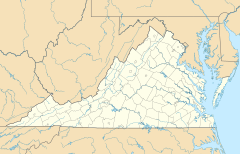| Ginter House | |
|---|---|
 Ginter House, Richmond VA | |
| General information | |
| Location | Richmond, Virginia |
| Country | United States |
| Coordinates | 37°32′28″N 77°26′5″W / 37.54111°N 77.43472°W |
| Current tenants | Virginia Commonwealth University |
| Completed | 1892 |
| Owner | Virginia Commonwealth University |
| Design and construction | |
| Architect(s) | Harvey L. Page, William Winthrop Kent |
| Website | |
|
rvahub | |
Ginter House is the historic 1892 former residence of Lewis Ginter. [1] It is owned by Virginia Commonwealth University (VCU) and is home to the provost's office. It was used as Richmond's first public library from 1925 until 1930, was used as part of a school, and was the main administrative building on the Monroe Park, Virginia campus of VCU for more than 40 years. [2] [3] In September 2020, the University’s Board of Visitors voted to de-commemorate several buildings on campus named for members of the Confederacy including the Lewis Ginter house. [4] The house is now simply known as the "VCU Administration Building". [5]
History
The home was built from 1888 to 1892 for Ginter, a cigarette magnate and philanthropist who developed an area of Richmond's north side and built the Jefferson Hotel. Harvey L. Page and William Winthrop Kent were brought in from Washington, D.C. to design the home. It is three and one half stories high and includes a polygonal three-story tower. It uses brownstone at its base, pecked brownstone on the first floor, patterned brick, and stone panels. The roof employed Spanish tile. [2]
The home has a mahogany library and ironwork done by G. Krug and Sons. Ginter never married and lived in the home with John Pope, his younger business associate and long-time friend, and Ginter's niece Grace Arents. [6] When Ginter died on October 2, 1897, the home and his fortune were left to Arents (1848-1926). [2]
Richmond Public Library and Richmond School of Social Work and Public Health
In 1924, Ginter House became the first site for the newly founded Richmond Public Library. The home's library was used by students of the Richmond School of Social Work and Public Health which was established across the street in 1925 (now Founder's Hall). When the new Richmond library (aka Dooley Library) was opened in 1930, its books were moved to the new location and the Richmond School of Social Work and Public Health purchased Ginter House and property in 1930. It was used for its library, as classroom space and offices. It later became used only for administrative functions. [2] The school became Richmond Professional Institute (RPI). It merged in 1968 with the Medical College of Virginia to become Virginia Commonwealth University. [2]
An east wing was added as part of a WPA project in 1939 and a west wing was added on to the back in 1949. [2]
An example of Richardsonian architecture, [2] it is located on the corner of Shafer Street and West Franklin Street at 901 West Franklin Street. The home features decorative woodwork, ornate fireplaces, stained glass windows, leather wallpaper and wrought iron detailing. [3]
Summer residence
In the late 19th century, Ginter built a large luxurious, Victorian-style mansion in Richmond's North Side for his summer home where he lived with John Pope. Westbrook had a tower, the top floor of which was used by the major as a private barbershop. The home was filled with dark wood paneling in oak, birch, mahogany and cherry. Fireplaces were constructed with imported tile in various designs and colors. It became a psychiatric hospital in 1911. The house was demolished in 1975. [7] [8]
See also
References
- ^ Gay Richmond then and now Ginter House Gay Richmond Virginia
- ^ a b c d e f g History by Ray Bonis Office of the Provost, VCU It is now used as administrative offices.
- ^ a b Ginter House VCU
- ^ "VCU approves removal of on-campus Confederate names, symbols". VIRGINIA COMMONWEALTH UNIVERSITY. September 18, 2020. Retrieved October 8, 2023.
- ^ "VCU ADMINISTRATION BUILDING (FORMER LEWIS GINTER HOUSE)". ARCHITECTURE RICHMOND. ARCHITECTURE RICHMOND. July 30, 2023. Retrieved October 8, 2023.
- ^ Burns, Brian (2011). Lewis Ginter, Richmond’s Gilded Age Icon. Charleston, SC: The History Press. p. 112. ISBN 978-1-62584-223-7.
- ^ Kappatos, Nicole (Aug 22, 2016). "From the Archives: In 1911 Lewis Ginter's North Side mansion was turned into a 'sanatorium' for the mentally ill". The Richmond Times-Dispatch. Retrieved December 17, 2019.
- ^ Childers, Doug (Sep 2, 2017). "Lewis Ginter: 'He gave Richmond its gilding during the Gilded Age". The Richmond Times-Dispatch. Retrieved December 17, 2019.
Further reading
- Dale Wheary "The Sense of Truth and Beauty: Harvey L. Page Builds a House for Lewis Ginter" from The Architecture of Virginia: Abstracts of the 1994 Architectural History Symposium Department of Art History, Virginia Commonwealth University, 1994.
- Mary H. Mitchell and Robert S. Hebb A History of Bloemendaal Richmond Lewis Ginter Botanical Garden, Inc. 1986.

